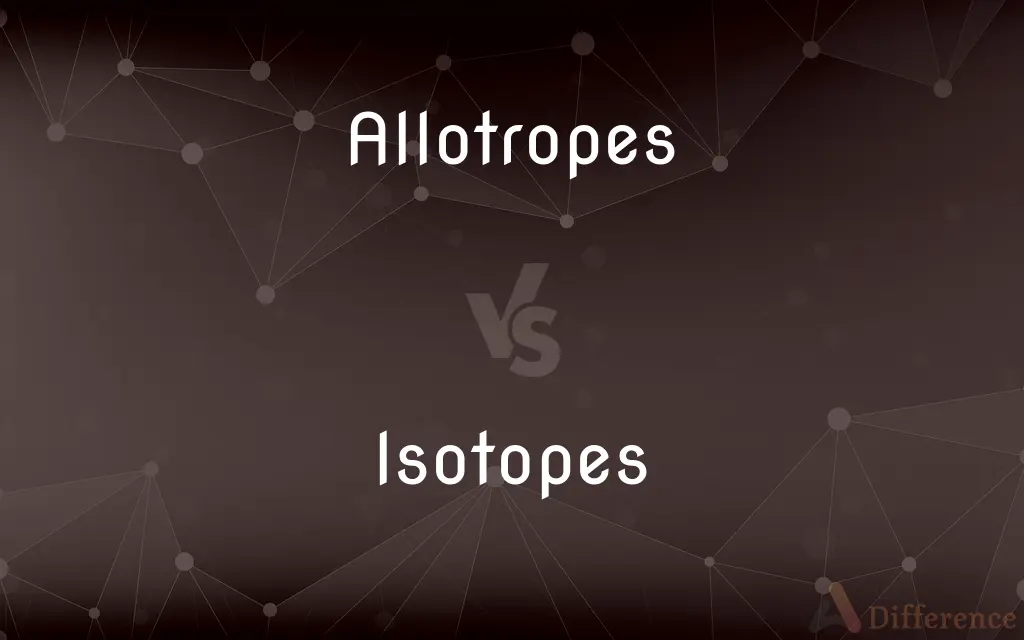Allotropes vs. Isotopes — What's the Difference?
By Tayyaba Rehman — Published on November 26, 2023
Allotropes are different forms of the same element with distinct physical or chemical properties; Isotopes are atoms of the same element with differing numbers of neutrons.

Difference Between Allotropes and Isotopes
Table of Contents
ADVERTISEMENT
Key Differences
Allotropes and Isotopes are concepts that describe variations of elements. Allotropes refer to different structural modifications of the same element, where the element exists in different forms due to variations in the arrangement of atoms.
For example, carbon can exist as graphite, diamond, and graphene, all of which have different atomic structures but are all made of carbon atoms. Isotopes, on the other hand, relate to atoms of the same element that possess different numbers of neutrons, resulting in a variation in atomic mass. Carbon-12 and Carbon-14 are isotopes of carbon. While the former has 6 neutrons, the latter has 8.
In essence, while Allotropes concern the arrangement of atoms, Isotopes revolve around the atomic composition concerning neutrons.
Comparison Chart
Definition
Different structural forms of the same element.
Atoms of the same element with different neutron numbers.
Cause
Varying arrangement of atoms.
Varying numbers of neutrons in the nucleus.
ADVERTISEMENT
Examples
Diamond and graphite for carbon.
Carbon-12 and Carbon-14.
Physical Properties
Can vary significantly.
Mostly similar except for mass.
Chemical Properties
Can be different.
Generally remain consistent across isotopes of an element.
Compare with Definitions
Allotropes
Variations of an element due to differing atomic arrangements.
The hardness of diamond and the softness of graphite demonstrate the properties of carbon allotropes.
Isotopes
Variants of an element differing in atomic mass.
Carbon-12 and Carbon-14 are isotopes with different nuclear compositions.
Allotropes
Different physical forms of the same element.
Diamond and graphite are allotropes of carbon.
Isotopes
Atoms of an element with varying numbers of neutrons.
Hydrogen has isotopes like protium, deuterium, and tritium.
Allotropes
Different configurations of the same element's atoms.
The study of allotropes provides insights into an element's versatility.
Isotopes
Same element atoms with distinct neutron counts.
The radioactive decay of isotopes helps in radiometric dating.
Allotropes
Structural modifications of a singular element.
O₂ and O₃ are allotropes of oxygen.
Isotopes
Atoms having the same atomic number but different mass numbers.
The medicinal field uses certain isotopes in radiation therapies.
Allotropes
Distinct forms of an element with varied bonding patterns.
The different appearance and texture between graphite and diamond are due to their allotropic nature.
Isotopes
Versions of elements with consistent proton counts but varying neutron numbers.
Isotopes have opened avenues for research in nuclear physics.
Allotropes
A structurally differentiated form of an element that exhibits allotropy.
Isotopes
One of two or more atoms having the same atomic number but different mass numbers.
Allotropes
Plural of allotrope
Isotopes
Plural of isotope
Common Curiosities
Which is responsible for an element's radioactive nature, allotropy or isotopy?
Isotopy. Certain isotopes of elements can be radioactive.
Can a single element have multiple allotropes?
Yes, for instance, carbon has several allotropes like graphite, diamond, and fullerene.
Which has more impact on atomic weight, isotopes or allotropes?
Isotopes, as they differ in neutron numbers, affecting the atomic mass.
Do all elements have allotropes?
No, not all elements exhibit allotropy. Allotropy is common in certain elements like carbon and oxygen.
How can isotopes be separated?
Isotopes can be separated using techniques like mass spectrometry or centrifugation.
Are all allotropes of an element chemically identical?
No, allotropes can have different chemical properties due to their distinct atomic arrangements.
Are the differences between isotopes always large?
No, isotopic differences can be subtle and sometimes detectable only using specialized equipment.
Can isotopes of an element undergo different chemical reactions?
Generally, isotopes of an element exhibit similar chemical behavior, but differences may arise in reaction rates.
Are isotopes always naturally occurring?
While many isotopes occur naturally, some are synthetically produced in labs or reactors.
Are the physical properties of allotropes different?
Yes, allotropes can have significantly different physical properties like hardness, conductivity, and appearance.
Share Your Discovery

Previous Comparison
Variance vs. Standard Deviation
Next Comparison
Highlights vs. StreaksAuthor Spotlight
Written by
Tayyaba RehmanTayyaba Rehman is a distinguished writer, currently serving as a primary contributor to askdifference.com. As a researcher in semantics and etymology, Tayyaba's passion for the complexity of languages and their distinctions has found a perfect home on the platform. Tayyaba delves into the intricacies of language, distinguishing between commonly confused words and phrases, thereby providing clarity for readers worldwide.













































